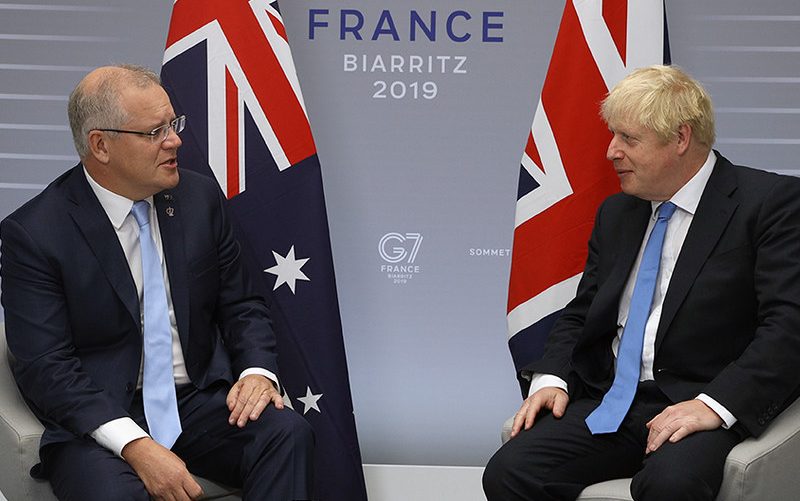50 years after the then UK defence secretary Denis Healey announced Britain’s cash-strapped retreat in 1968 from the Indo-Pacific, the UK is once again drawn into the geoeconomic and geostrategic challenges of the maritime region. This desire to extend Britain’s strategic horizon was accelerated by the vote to leave the EU in 2016. In particular, the decision to leave the European single market has forced Downing Street to strengthen its trading relationships with partners beyond the EU – a considerable number of which reside in the Indo-Pacific region.
But after a decade of solid bilateral economic relations with China, British Prime Minister Boris Johnson is under no illusions about the strategic challenges the Chinese Communist Party poses to the international liberal order. The reappraisal of the golden age of British relations with China has been driven by the realisation that these economic ties can no longer be separated from the UK’s wider security interests. China’s economic coercion and political espionage against Australia has illustrated this perfectly: economic dependence on the Chinese market and Chinese investment are easily used as the carrot and stick to pressure the country to conform to Beijing’s demands. At the height of the COVID-19 pandemic, Downing Street was notably awestruck by the extreme misinformation promoted by the CCP, attempting to suggest that the US military was somehow responsible for the emergence of the virus.
China’s repressive activities in Hong Kong and its treatment of Uyghur Muslims, have provoked the realisation that China’s predicted political liberalisation will not materialise. With this year’s UK Integrated Review highlighting a more persistent British presence in the Indo-Pacific, it is therefore increasingly important for Australia to ascertain the extent to which the UK will be able to fully rebalance its strategic priorities towards this maritime region.
Greater defence cooperation
Over the centuries, the relationship between Australia and the UK has been underpinned by a shared cultural heritage and a common belief in the values of democracy and freedom. Canberra and London are also members of the Indo-Pacific region’s most enduring multilateral defence alliance: the Five Power Defence Arrangements. The US-led Five Eyes group has also underpinned the strategic relationship between Australia and the UK over the decades. With Australia’s 2020 defence strategic update recognising the deteriorating geostrategic environment of the Indo-Pacific – greater bilateral cooperation between Australia and the UK is paramount to preserving the rules-based regional order.
As maritime nations, the economies of Australia and the UK depend on the free flow of trade and investment, which thrive on the foundations of the rules-based international order. But China’s increasing encroachments in the Indo-Pacific region, particularly in the South China Sea, increasingly undermine the free movement of goods and services in the maritime region. With China’s belligerent activities challenging the trade and economic interests of the UK and Australia, the two powers must take steps to strengthen their joint military interoperability to preserve the peace and stability of the maritime region. Bilateral military defence cooperation between Australia and the UK is already closely integrated through the 2013 Defence and Security Cooperation Treaty, which formalises and encapsulates close practical cooperation on common strategic defence and security issues. In addition, strategic cooperation between London and Canberra has been boosted by the signing of a new trilateral security partnership ‘AUKUS’ in partnership with Washington – under which the UK and US will help Australia build eight nuclear-powered submarines. The three nations have also pledged to work closely together to counter China’s hybrid warfare activities.
Accelerated values-based diplomacy
With the British review keen to uphold liberal democratic values in the Indo-Pacific, the UK will work alongside Australia to deepen these values in the region. It has already defined its post-Brexit international ambition by joining the Association of Southeast Asian Nations as a formal dialogue partner and by launching formal negotiations to join the Comprehensive and Progressive Agreement for Trans-Pacific Partnership (CPTPP). This latest dynamic shows that Britain is ready to make up lost strategic and economic ground in the Indo-Pacific.
With COVID-19 further accelerating China’s growing economic and strategic influence in Southeast Asia, greater British and Australian engagement is needed however to convince the region that the liberal democratic system is the best medium for economic development. The ongoing health crisis has seen countries in the region take an increasingly illiberal turn: Thailand has reverted to monarchy-military rule; Vietnam and Cambodia have stepped up repression of government critics; Myanmar’s military has deposed the country’s civilian government; Malaysia has intensified its crackdown on free speech.
Faced with the threat of China’s growing asymmetric economic and strategic influence in Southeast Asia, the UK and Australia can guard against this risk by investing in an outward-looking strategy. With infrastructure financing seen as a key component of economic development in ASEAN countries, the UK’s renewed regional focus provides an opportunity for the Johnson government to join Australia in managing the infrastructure needs of Southeast Asian countries. The UK’s former foreign secretary, Dominic Raab, notably demonstrated the Johnson government’s willingness to revive Britain’s historic economic engagement in the region, by signing an economic agreement with Vietnam in December 2020 and participating in a high-level video conference with ASEAN foreign ministers on the region’s post-pandemic economic recovery in April.
A European security focus will equally persist
While the Indo-Pacific region features heavily in the UK’s review, the Johnson government will continue to engage in European security management. The Defence Command paper in particular identifies the European area as a key component of Britain’s immediate security interests. Although newly divorced from the EU since January, it is likely that the Johnson government will seek to leverage the UK’s defence position through the North Atlantic Alliance. After all, the Integrated Review sees Russia as the most immediate threat to the UK’s security. The geopolitical environment is particularly characterised by Russia and Belarus holding large-scale cross-border military drills and Russia building a joint training centre near the Polish and Lithuanian border with Belarus. This backdrop is compounded by groups linked to Russian intelligence services frequently orchestrating cyber-attacks across the Euro-Atlantic region.
In light of this volatile backdrop, the Johnson government will rely on its defence and deterrence across Europe. The UK will seek to become a key ally in the Biden administration’s European security strategy: by boosting UK operating forces in the Euro-Atlantic area from the High North to the Black Sea, enhancing the capabilities of the Ukrainian armed forces and through increasing the cyber security resilience of Eastern European countries. This means that the UK-Russia relationship will remain as confrontational as that between Russia and the US.
For Australian foreign policy circles, this reality means that the Morrison government will seek to leverage its strategic engagement with regional partners in the Indo-Pacific. Australia will notably continue to build the security resilience of the Quadrilateral Security Dialogue with the US, India and Japan. Leaders of the Democratic Quad are expected to convene at the end of the month for their first physical summit, during which managing China’s growing malign activity in the South China Sea will be discussed. The current juncture therefore offers Australia significant space to deepen its strategic engagement in the Indo-Pacific.
Sources Clinch, M & Srivastava, S. (2019). ‘Boris Johnson secures biggest Conservative Party election win since 1987’, CNBC , December 13, 2019. Decis, H. (2021). ‘Posturing and presence: the United Kingdom and France in the Indo-Pacific’, The Institute of International Strategic Studies, London: United Kingdom. Dollar, D & Stromseth J. (2021). ‘The US must urgently rethink its economic policies in Asia Washington is being left behind as China sprints ahead’, Brookings, Washington: United States. Feng, C. (2020). ‘What’s behind China’s bullying of Australia? It sees a soft target — and an essential one’, The Conversation, December 20, 2020. France Diplomacy. (n.d). ‘France’s Indo-Pacific Strategy’, Ministry for Europe and Foreign Affairs, 3-73. Gould-Davies, N. (2021). ‘The Russia challenge for ‘global Britain’, The Institute of International Strategic Affairs, London: United Kingdom. Graham, E. (2020). ‘Australia’s serious strategic update’, The International Institute for Strategic Studies, London: United Kingdom. HM Government. (2021) ‘Global Britain in a competitive age The Integrated Review of Security, Defence, Development and Foreign Policy’, HM Government, London: United Kingdom. HM Government. (2021). ‘Virtual meeting between ASEAN Foreign Ministers and the Foreign Secretary: ASEAN Chairman’s statement’, HM Government, April 19, 2021. Kaushik, K. (2020). ‘Explained: The purpose, participants of the Malabar Navy Exercise’, The Indian Express, November 3, 2020. Kumar, V. (2020). ‘Australian ship joins Indian Navy in the Bay of Bengal’, Special Broadcasting Service, November 11, 2020. Lee, Y.N. (2020). ‘China’s influence in Southeast Asia is growing — and the U.S. has some catching up to do’, CNBC, June 12, 2020. Lorch, J & Sombatpoonsiri, J. (2020). ‘Southeast Asia Between Autocratization and Democratic Resurgence’, Carnegie Europe, Brussels: Belgium. Manning, R.A & Przystup, J. (2021). ‘The Quadrilateral Security Dialogue Is Consolidating Its Power Against China’, The National Interest, July 4, 2021. Special Broadcasting Service. (2013).‘New defence treaty between Australia and UK’, Special Broadcasting Service, August 28, 2013. Vu, K. (2020). ‘Vietnam, Britain sign free trade deal, to take effect Dec. 31’, Reuters, December 30, 2020. West, J. (2021). ‘From the bookshelf: ‘In the dragon’s shadow: Southeast Asia in the Chinese century’, Australia Strategic Policy Institute, Canberra: Australia.








Be First to Comment